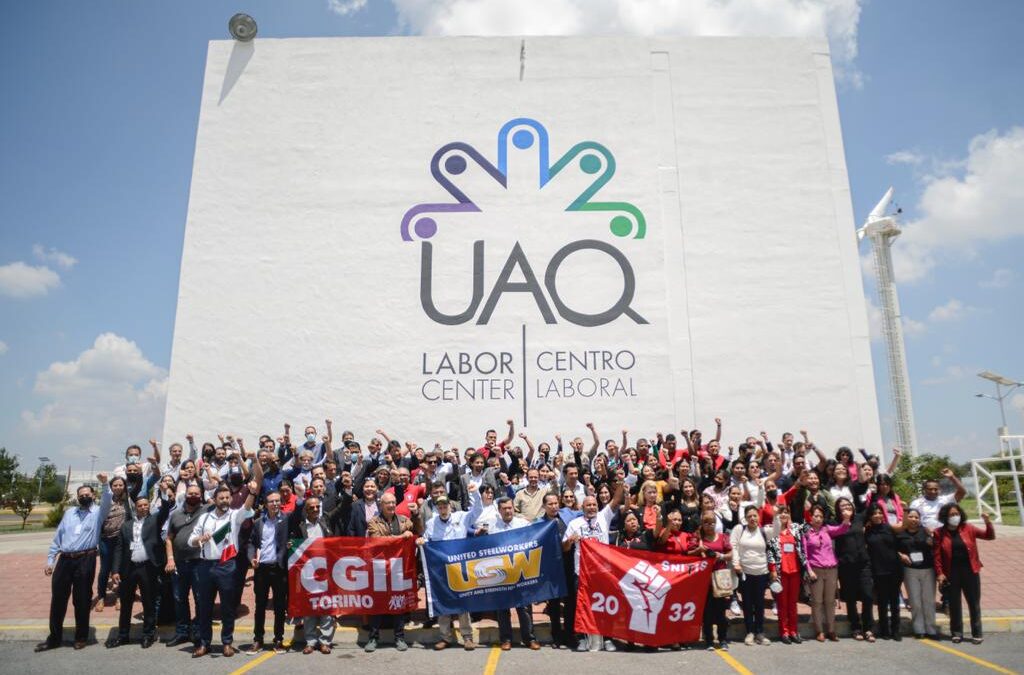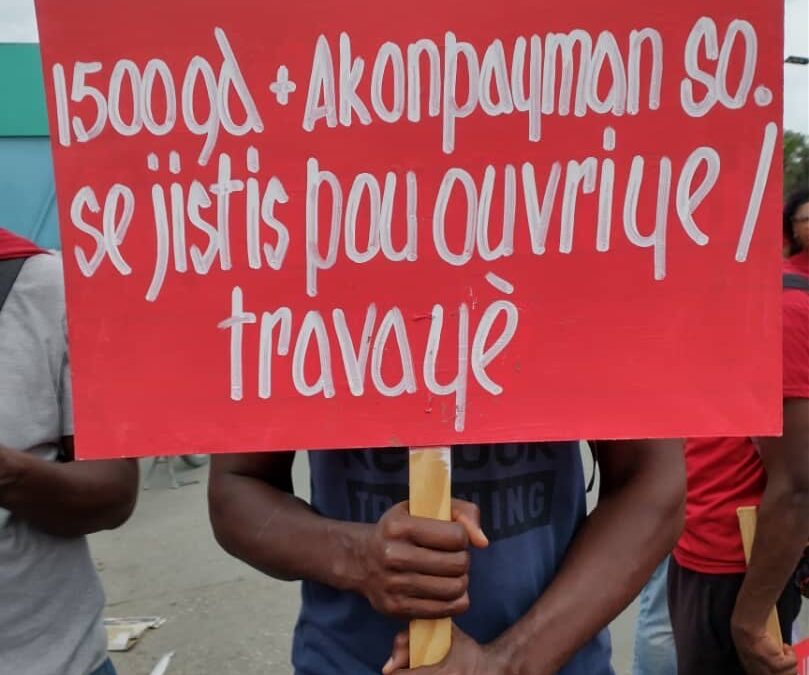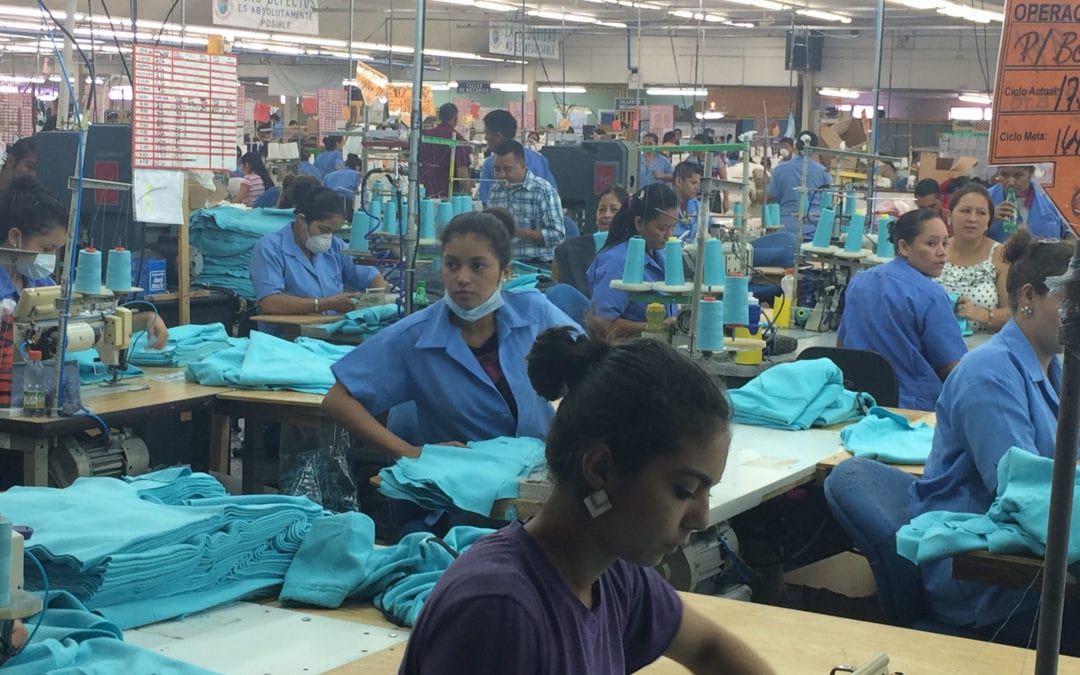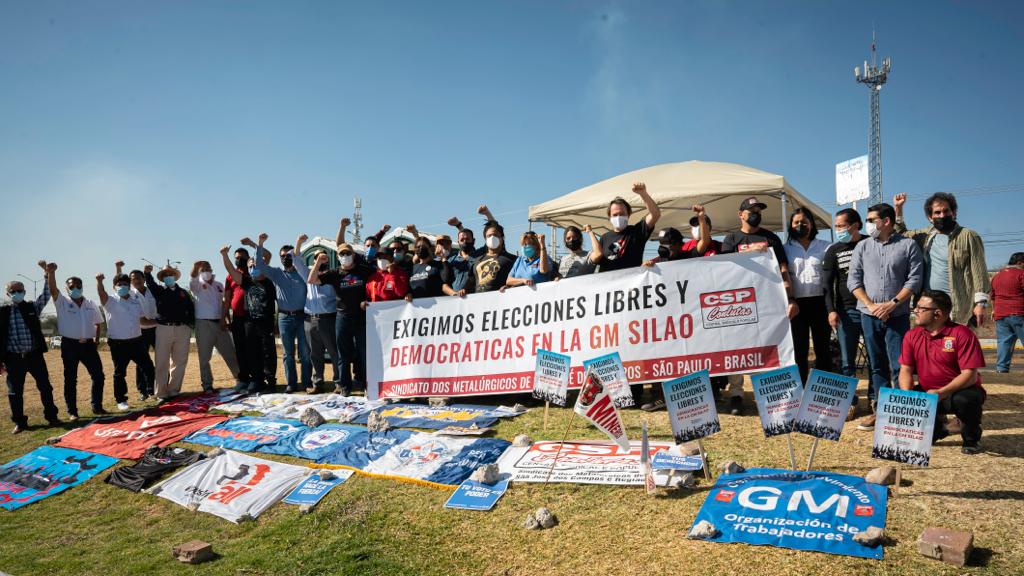
Sep 2, 2022
A new Labor Center in Mexico will advise workers about their rights and how to mobilize and organize unions and collectively bargain. The Labor Center, at the Autonomous University of Querétaro in central Mexico, is supported by the Solidarity Center and the UCLA Labor Center.
“The aim is to strengthen and promote the full recognition of labor rights, freedom of association and organization, and the democratic participation of workers through research, linkage and accompaniment,” said Labor Center Director Dr. Javier Salinas García. Salinas spoke at a recent Solidarity Center event in Mexico to announce the opening.
The Labor Center comes three years after Mexico’s government announced a series of comprehensive labor reforms to establish a democratic unionization process, address corruption in the labor adjudication system and eradicate employer protection (“charro”) unions prevalent in the country.
The Labor Center is “a way to respond to the needs of the situation,” said Beatriz García, Solidarity Center Mexico deputy program director.
“I think we all agree that Mexico is going through a historic moment. The labor reform responds to the demands that have been the objectives of the struggle of many workers for years, for decades, and reflects some positive practices of the independent unions,” she said.
The event featured a panel of independent union members and leaders who discussed the future of the labor movement in Mexico in the wake of historic labor law reforms.
Panelists explored the role that democratic and independent trade unions in promoting labor reform implementation in Mexico three years after the 2019 Labor Reform and negotiations of the United States–Mexico–Canada Agreement (UMSCA/T-MEC).
Speakers shared how they are using the tools of labor reform to organize on their worksites.
“We are the delegates, and we call our colleagues to share information about the Union League,” said Sonia Cristina García Bernal. “We have helped colleagues who were told they were going to be fired without severance pay. We have been able to get them severance pay. We have been able to get them rehired.”
“After these three years, the tool that we use the most is fast response mechanisms,” said Imelda Guadalupe Jiménez Méndez. “This has been a very important tool.”
In addition to Beatriz García, speakers included: Imelda Guadalupe Jiménez Méndez, Secretary for Political Affairs, the Miners Union (Los Mineros); Julieta Mónica Morales, General Secretary, Mexican Workers’ Union League (Liga Obrera Mexicana); Rita Guadalupe Lozano Tristán, Mexican Workers’ Union League (Liga Obrera Mexicana); Alejandra Morales, General Secretary, Independent Union of National Workers in the Automotive Industry; and Sonia Cristina García Bernal, Special Delegate, Mexican Workers’ Union League (Liga Obrera Mexicana).

Aug 9, 2022
Haitian garment workers scored a huge victory as a coalition of unions negotiated an agreement with the government to provide garment workers in Port-Au-Prince with transportation and food stipends.
“In our struggle for a better working environment and fair wages we have always emphasized that the government should provide social support to workers, especially those in the textile sector. And here it is for the first time that our demands have been heard, even if it is not yet in effect, but the government has planned to accompany the workers by offering them transportation and food costs for an amount of 135,000,000 gourdes ($1,116,595),” said Telemarque Pierre, coordinator of SOTA- Batay Ouvriye.
“From now on, we would like the government to take care to include these accompaniments in the annual budgets so that the workers can always benefit from these advantages.”
The government will distribute the funds via a mobile app. The stipend will cover the cost of travel to and from the factory, and include a lunch stipend. Inflation and gang violence have led to skyrocketing prices for food and fuel such that workers cannot afford travel to and from work or food at lunchtime.
The agreement underscores the importance and effectiveness of unions in improving the lives of workers.
“We can say now that every time there is a problem, the workers come to the union because they always find that the unions are a real help,” said Eliacin Wilner, GOSTTRA organizer.
Unions are working to ensure that workers are aware of the program and able to access their benefits.
The agreement is the result of minimum wage protests by garment workers in January 2022. Fueled by frustration over three years without a minimum wage increase and the rising cost of basic necessities and services, workers at the SONAPI industrial park in Port-Au-Prince held a spontaneous protest to call for a wage increase.
The peaceful demonstrations extended into February and were met with police violence.
The protests led to negotiations between the government and a coalition of nine textile unions. The coalition’s advocacy resulted in an increase of the minimum wage from 500 gourdes ($4.82) per day to 685 gourdes ($5.85) per day.
Solidarity Center studies repeatedly have demonstrated the daily minimum wage is far less than the estimated cost of living in Haiti. Significant job losses due to supply chain disruptions have left most garment workers facing diminished working hours or layoffs, threatening their ability to provide for their families. These periods of income precarity are especially dire given that most low-wage garment workers lack savings.

Jun 1, 2022
A powerful new report shows that collective bargaining changes work and workers’ lives for the better. According to the report, workers in Honduras with collective bargaining agreements are less likely to feel compelled to migrate or to face verbal abuse, and they earn more than workers without collective bargaining agreements. The Solidarity Center-supported report, “Bargaining for Decent Work and Beyond: Transforming Work and Lives Through Collective Bargaining Agreements in the Honduran Maquila Sector,” was published by the Center for Global Workers’ Rights.
“Collective bargaining ultimately is about transforming lives,” said Solidarity Center Executive Director Shawna Bader-Blau, who moderated a panel discussion launching the report. “Not only do better wages and working conditions result from collective bargaining, but workers report dignity and respect on the job for the first time through collective bargaining and unions.”
Report author Mark Anner, director of Pennsylvania State University Center for Global Workers’ Rights, highlighted some key findings of the report. He said:
- Workers covered by a collective bargaining agreement are 25.3 percent less likely to feel compelled to migrate than workers without a collective bargaining agreement.
- Honduran garment workers with a collective bargaining agreement are 67 percent more likely to always have the choice to work overtime or not.
- Workers not covered by a collective bargaining agreement are 20.3 percent more likely to face verbal abuse.
- Female workers without a collective bargaining agreement are 10.7 percent more likely to face sexual harassment on the job.
- Workers with collective bargaining agreements earn 7 percent more than workers without collective bargaining agreements.
“Workers experience tangible and intangible benefits from having collective bargaining agreements,” Anner said. He quoted some workers as saying, “We are listened to now” and “Management shows us respect as workers.”
The report documents the expansion of collective bargaining agreements in the maquila sector, following a 2009 binding agreement between workers and a garment manufacturer. As of last year, 50,625 workers, mostly in the garment industry, were covered by 21 collective bargaining agreements in the Honduran export assembly sector.
Bader-Blau emphasized that the report shows the importance of worker-driven research, as suggested by the Solidary Center. “Unions lead and show outcomes to the rest of the world through the power of their own stories,” she said.
Union leaders like Eva Argueta, a leader in organizing tens of thousands of garment workers in Honduras, led the process of connecting with workers to help them share their work experiences.
Speaking on the panel, Argueta, representative for the General Workers Central (CGT, Honduras) and Maquila Organizing Project coordinator, described the process. “The person responding is much more likely to trust someone that they know who is doing the survey,” she said. “It can be a delicate thing because of the fear the boss might find out.”
Worker-leaders interviewed a total of 387 workers with and without collective bargaining agreements.
Other panelists included Joel López, general secretary of the Independent Federation of Workers of Honduras (FITH), Tara Mathur, field director for the Americas at the Worker Rights Consortium (WRC), and María Elena Sabillón, Solidarity Center senior coordinator in Honduras.
As Sabillón shared in her remarks, “Collective bargaining agreements allow for real progress in both labor and human rights. CBAs today go beyond economic clauses. Unions are winning clauses on equality, combating violence and harassment in the world of work and respecting the dignity of each person. These CBAs are validating a broader rights-based approach.”

Feb 3, 2022
The new, independent union, Sindicato Independiente Nacional de Trabajadores y Trabajadoras de la Industria Automotriz (SINTTIA), won the right to represent more than 6,000 workers at a truck plant in Silao, Mexico, in a closely watched election. SINTTIA won the election by a wide margin, defeating the entrenched CTM labor group that had held the contract at the plant for 25 years, and two other groups with ties to CTM.
SINTTIA won with 4,192 votes out of 5,389 valid ballots, in an election with 90 percent turnout. The three CTM unions combined won just over a thousand votes.
The victory happened despite attempts to buy votes and intimidate workers, and threats of violence leveled against union leaders and activists. One of those threatened was SINTTIA General Secretary María Alejandra Morales Reynoso. She spoke about the victory at a press conference.

SINTTIA General Secretary Maria Alejandra Morales Reynoso / Credit: Solidarity Center
“Today is a day in history for Mexican workers,” says Morales Reynoso. ” And we have just begun.”
SINTTIA’s victory could signify the beginning of the end of CTM’s decades-long hold on power. The labor group derived its strength from secret contracts, intimidation of workers and close relationships with Mexico’s previous ruling party and employers, whom they appeased by keeping wages low.
The election is a significant test of the impact of trade reforms, which expand worker rights and establish union votes by secret ballot to validate labor contracts. Mexico’s government estimates that prior to reforms, about 80 percent of union contracts were signed without workers’ knowledge, and helped suppress wages and give employers more control over workers.
At this one truck plant this week, workers were able to overcome corruption and threats of violence to vote out the sham union. Thousands of workers now have a chance at collective bargaining, raising wages and improving working conditions, but much work remains to ensure free and fair elections at thousands of workplaces for millions of Mexican workers.





